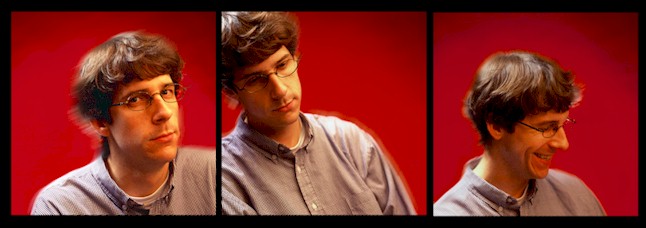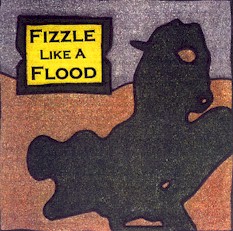|

Golden Sand and
the Aksarben Grandstand
From his bedroom to your
headphones, Fizzle Like a Flood's ode to Aksarben musically captures the
essence of a dying horsetrack and the sentimental memories it holds, both
real and unreal.
by tim mcmahan
|
|
|
Want more current
Fizzle?
Check out the Jan. 2004
Lazy-i Interview.
Lazyeye: Nov. 1, 2000 |
You
can tell by his reaction that Doug Kabourek, the
singer/songwriter/performer who goes by the strange moniker Fizzle Like a
Flood, is genuinely surprised that anybody would want to listen to his
music.
Rarely has there been such a Doubting Thomas when it comes to a
composer's own music. Here's a guy that says his goal is to sell a measly
100 copies of his latest CD -- just enough to generate the cash necessary
to professionally manufacture his next CD instead of having to burn CDRs
in his bedroom.
A request for an interview after listening to his latest effort, a
sort-of tribute to the now-defunct Aksarben racetrack called Golden
Sand and the Grandstand, was met with disbelief (he's never done an
interview before) and surprise that someone would think that his CD was
good enough to write about.
In fact, Golden Sand is a dreamlike soundtrack, a slice of indie-rock
flavored nostalgia that will touch anyone who's ever strolled along
Aksarben's now rust-covered paddock, played Frisbee on the track's grassy
infield, or put a few bucks on the nose of Who Doctor Who.
The gangly, dark-haired, bespeckled Kabourek says he's never placed a
bet at an Aksarben window and hasn't even sat in the grandstand on race
day. The CD's concept instead grew out of the countless shuttlebus trips
Kabourek took between the Aksarben parking lot and the University of
Nebraska at Omaha campus, where he started taking classes last fall.
"I would get on the bus and ride by that grandstand every day and
just dream up stories," Kabourek said from a well-worn Laz-y-boy
inside his Bellevue home. "My dad gave me a book about Aksarben for
reference, and I thought it would make a good concept album." |
|
|
Kabourek
has anonymously played a role in the Omaha and Iowa City music scene for
six or seven years, first jamming with the band that would become Norman
Bailer (an early incarnation of The Faint). He left Todd Baechle and
company after they recorded a cover of Joan Jett's "I Love Rock 'n'
Roll." "I didn't think they'd get anywhere," he said.
Instead, he moved to Iowa City to play drums in Matchbook Shannon, a
power-pop trio whose high point after three years together was playing a
gig at the famed Lounge Ax in Chicago for an audience that included Sen.
Phil Gramm. "I didn't even know he was there 'til after we were
gone," Kabourek said.
He left the band when he moved to Bellevue in July 1999 after his wife,
Julie, got a teaching job at Bellevue East. With some leftover Matchbook
Shannon songs in tow, he began recording demos out of his bedroom,
rechristening himself as The Laces. The debut tape, Thank You and
Goodbye, and his first CDR, the endearing Forever For Now,
captured his cuddly, happy-to-be-sad emo-pop songwriting style.
Unfortunately, you could barely hear the songs on the muddy, weak-signaled
recordings.
What a difference a year and a name change makes. In comparison to
those early efforts, Fizzle Like a Flood's Golden Sand and the
Grandstand is an aural tour de force -- sort of a mix between Pet
Sounds-era Beach Boys (Kabourek even uses a slide theremin on some
tracks), Ben Folds Five (lots of keyboards), and the Flaming Lips (trippy,
loopy melodies; nasal vocals). The CD is sweeping, grandiose and genuinely
touching in its audacity. It's amazing, considering the entire project was
recorded and mixed in Kabourek's home studio using little more than a
microphone, a small multi-track recorder and a PC. His home studio looks
like a high school kid's bedroom, with rock show posters Scotch-taped to
the walls, a beat-up acoustic guitar and snare drum stashed in a corner,
and second-hand office furniture covered in CDs, tapes and show flyers.
It's hardly a pristine "sound environment." |
"I
would get on the bus and ride by that grandstand every day and just dream
up stories."
|

Both personal and cinematic at the
same time, Golden Sand and the Grandstand is a rock opera with a
tender heart, created by an insecure loner who's very nature reflects the
down-and-out quality of his music.
|
But it's all Kabourek needs. The boy
wonder has figured out how to take these simple tools and push the sonic
envelope by layering tracks upon tracks upon tracks (an average of 40
tracks on each song) with tons of sound effects that he's either recorded
himself or taken from various sound-effect websites.
His creative process involves splicing together numerous small song
sections that have been recorded separately. "I never mix a song, I
mix part of a song," he says.
For example, on the CD's high-water mark, the sentimental charmer
"Believe In Being Barefoot," Kabourek opens with a portion
recorded in his backyard, the cicadas making almost as much noise as his
guitar and his shy, pip-mouse voice. "The orchestrated part is
spliced into whatever comes next," he said. "Then another splice
is added with a loud chorus." Meanwhile, another track holds the
sound of whistling fireworks, while dozens of other tracks contain vocal
harmonies. After a big buildup, the song backs down again and the
harmonies fade, leaving only the cicadas.
The last song of the CD's concept cycle, the lilting-then-driving
"Delayed Dedication," pushes the sound effects over the top as
it builds to an enormous wall of fireworks exploding to an ear-splitting
crescendo, symbolically marking the opening of Kabourek's make-believe San
Gabriel Downs horse track.
Lyrically, the CD travels backward in time from the first song to the
last. "Shadows," opens years after the racetrack has been
closed. A grandfather clock, lonely keyboards and Kabourek's Beach
Boys-style harmonies nest the opening lines "The money's not
around/The queen has lost her gown/The crests are taken down/Their guests
were so profound" referencing, Kabourek says, the Aksarben
coronations, among other things. The song then launches into an
echo-filled, march-like anthem and Pink Floydesque laughter/yell sound
effects ending with a familiar bugler's fanfare. Next, "A Dance with
the Dozer" captures the racetrack's last day and the arrival of the
demolition crew, while pointing fingers at the cause of the collapse:
"The patrons aren't around there/The dogs have taken their
share/The boats are guilty, too." (Sharp-eared listeners will
recognize a repeated synth sample stolen from "Call Call," a
track off The Faint's Blank-Wave Arcade CD, presumably stolen when
Kabourek was remixing "The Passives" for that band's 12-inch
remix compilation, released earlier this year).
In between the abandonment and dedication are nestled a handful of love
songs that follow the lives of the horse track's patrons, neighbors and
employees. "Falling Off a Star" recounts a jockey falling from
his horse as he tries to impress a would-be girlfriend. On "Again
This Summer," the same jockey laments another painful season spent
pining for the girl he can never have. "The Movie" recounts a
failed scheme to generate attendance by filming a motion picture on the
premises, while "Kissed in Stereo" is about a gambler finally
hitting a longshot.
Both personal and cinematic at the same time, Golden Sand and the
Grandstand is a rock opera with a tender heart, created by an insecure
loner who's very nature reflects the down-and-out quality of his music. |
|
|
Which brings us back to the fact that very few will probably ever hear
this CD. Though released on Chris Fischer's Unread Records label, Kabourek
is doing the lion's share of the CD's production, promotion and
distribution, individually "burning" each CDR and laser-printing
the labels and sleeves. Although copies are available at The Antiquarium
and possibly Homer's, as well as his website -- www.fizzlelikeaflood.com
-- there's little chance for distribution outside of Omaha.
And you can forget about seeing the CD performed live. "I would
like to get a band together, but it's a lot of work," Kabourek said.
"You'd have to take all this equipment to the show, and I'd have to
have a van. I tried to pull together a band to play The Laces' music last
summer but it didn't work out."
Right now, he's content with playing the songs acoustically, when
possible. "I would rather do a different interpretation of my sound
live than do a half-ass job recreating the CD," Kabourek said.
"We would have to have a lot of singers to make it work. Band
practices would be unbearable."
He says his next recording will be geared toward playing live, with
"super melodic" songs, few sound effects and possibly a band.
But don't expect him to enter a traditional recording studio any time
soon. Kabourek is content doing the recording at home.
"Home recordings to most big-shot music people fizzle
automatically as soon as they see the tale-tell blue underbelly (of the
CDR)," he said. "But I think it's a flood. I haven't heard any
other home recordings to match what I'm doing.
"I never know what it's going to sound like until it's done. I
would never be able to have all of it in my head before I entered a real
studio. I couldn't perform in front of a glass window with someone on the
other side saying 'Don't screw up.' Hopefully, my studio will always be my
bedroom."
Back to 
Published in Omaha Weekly Nov. 1, 2000. Photos
by Bill Sitzmann,
Copyright © 2000, used by permission. Story, Copyright © 2000 Tim
McMahan. All rights reserved.
|
"I
couldn't perform in front of a glass window with someone on the other side
saying 'Don't screw up."
|
|

![]() webboard
interviews
webboard
interviews